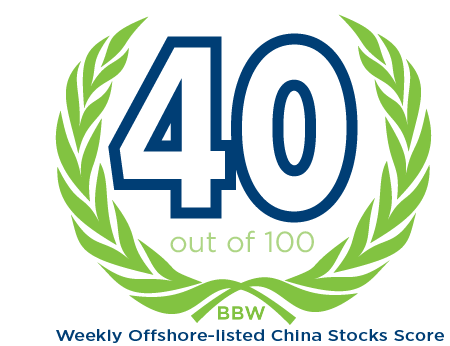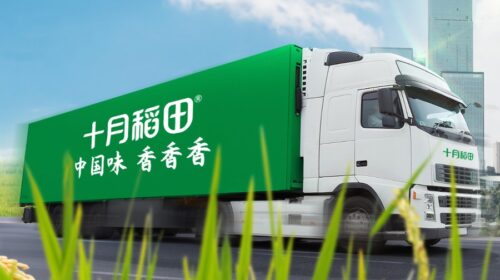CHINA BULLETIN: GDP Rebounds, as Putin Comes Calling


In this week’s issue GDP growth beats expectations, dueling export restrictions and the piping hot IPO for a top premium rice maker. On a scale of 1 to 100, we give the week a 40 for offshore-listed China stocks.
Doug Young, Editor in Chief
You can sign up to get China Bulletin weekly in your inbox.
MACRO
GDP Rebounds, as Putin Comes Calling
The two big stories last week were the latest GDP figures that showed China’s economy appeared to be picking up steam, and the latest edition of the Belt and Road (BRI) Forum in Beijing. GDP growth was the bigger of those, with the figure up 4.9% in the third quarter year-on-year. At the BRI Forum, the biggest headline was the attendance by Russian President Vladimir Putin.
There’s been much ado about the fact that the GDP growth was stronger than expected, and it does indeed seem to put China suspiciously close to its target for “about 5%” growth this year. Meanwhile, aside from Putin’s attendance, the BRI forum was mostly a beauty pageant of Global South leaders who were largely upstaged by the much bigger news happening in the Gaza Strip.
China Delays Another Global Merger
In another big story with global implications, China is flexing its muscle by delaying another big global M&A deal. This time, it’s Beijing’s approval for Broadcom’s $69 billion purchase of VMWare that’s taking longer than expected. Beijing hasn’t killed the deal, but may be taking longer than expected because such approvals require consultation with the Foreign Ministry and State Council.
This latest delay comes after China killed Intel’s plan to purchase Tower Semiconductor earlier this year using similar foot-dragging. Most people see this as Beijing expressing its displeasure at recent Western efforts to stifle China’s chip sector. The danger for Beijing is that Western chipmakers, fearful of having their M&A killed, may simply start avoiding doing business in China.
China Stocks Resume Their Downward Ways
After a brief rally two weeks ago, offshore-listed Chinese stocks resumed their recent downward ways despite the relatively positive third-quarter GDP report. The Hang Seng China Enterprises Index dropped 4% during the week, while the iShares MSCI China ETF fell 5.2%. The broader Hang Seng Index was also down 3.6%, hitting a fresh low for the year.
GDP news aside, the stock vultures continued to circle around fast-failing former real estate giants Evergrande and Country Garden. At the same time, announcements of new economic stimulus measures were relatively light last week as China turned most of its spotlight on the Belt and Road Forum in Beijing.

Industry
U.S. Bans More China Chip Sales, EU Eyes Unfair Wind Subsidies
China’s two biggest trading partners were taking more steps last week that could hobble some of the country’s most cutting-edge industries. The latest move by the U.S. continued its policy of banning the sale of some of its most cutting-edge chips and chip technology to China. Meantime, the EU reportedly is scrutinizing China for illegal subsidies to its wind energy sector.
Both moves extend recent campaigns by the U.S. and Europe, which are trying to prevent China from dominating some of the world’s most leading-edge technologies. While the U.S. campaign has gotten a lot of attention, the EU’s scrutiny of Chinese wind power equipment could also result in new tariffs that would deal a big blow to Chinese producers, so to speak.
China Rolls Out More Tech Material Export Restrictions
The U.S. and EU weren’t the only ones taking new actions that could dampen global trade last week. China was also busy on that front, this time rolling out new export restrictions for some types of graphite, an important element used to make electric vehicle (EV) batteries.
China is the world’s top graphite producer, and is also vying to become its dominant EV battery maker. This move, which will require special licenses for the export of graphite products, is undoubtedly aimed at stifling other countries’ efforts to develop their own battery makers. China rolled out similar restrictions earlier this year for two other metals used in high-tech products.
Gemdale Chairman Resigns, as Country Garden Defaults
Another ticking time bomb has emerged from China’s struggling property sector, this time with word that Gemdale’s longtime chairman has resigned, as the company struggles with 10 billion yuan in maturing debt. That comes as the larger Country Garden finally fell into default by missing a bond interest payment that was already overdue, but was still within a 30-day grace period.
The latest distress signs come as fresh data showed that investment in Chinese real estate contracted 9.1% in the first three quarters of this year compared with a year earlier. Construction starts by floor area fell by an even sharper 23.4%. That’s hardly surprising in the current market where prices are falling and transactions are plunging.

Company
Apple’s New iPhone Sales Disappoint, as Tim Cook Calls on Beijing
Global tech titan Apple was in a couple of China headlines last week, led by a report that sales of its latest iPhone 15 were off to a disappointing start. A separate report said that Apple chief Tim Cook also visited China’s commerce minister during the week, and discussed his company’s development in China as well as the U.S.-China trade relationship.
Cook’s visit is relatively minor news, since he was a frequent visitor before the pandemic and has returned since China reopened. The disappointing iPhone sales is more significant, and probably reflects a resurgence in China for Huawei, which surprised everyone in late August with its launch of a new cutting-edge smartphone that appeared to skirt U.S. sanctions on the company.
WH Group Eyes U.S. Listing for Smithfield
China’s WH Group made headlines in 2013 when it purchased leading U.S. pork producer Smithfield for $4.7 billion, marking one of the biggest takeovers of a U.S. company by a Chinese buyer at the time. Now, it seems WH Group is ready to give some of Smithfield back to U.S. investors with plans for a New York IPO for the unit as early as next year.
Much has happened since the landmark deal, including WH Group’s own listing in Hong Kong a year after the acquisition. But its shares now trade near a record low, partly due to all the turbulence in China’s pork market several years ago due to an outbreak of African swine fever. Smithfield benefited from that by exporting more pork to China, though those exports have tumbled this year.
Vanguard Exits Ant Group Joint Venture
Vanguard Group has offloaded its 49% stake in a robo-advisory services joint venture with Alibaba-affiliated Ant Group. The move is part of the U.S. fund giant’s broader flight from China’s 29 trillion yuan mutual fund market, coming after it shuttered some of its other China businesses earlier this year.
Vanguard’s retreat contrasts with larger rivals like BlackRock and Fidelity, which have been boosting their fund management businesses in China. Vanguard is more indicative of recent trends that have seen foreign funds flee from China on concerns of an economic slowdown. That said, there’s still plenty of money sloshing around the country in need of management.
AND FROM THE PAGES OF BAMBOO WORKS
| Haitong Retires International Unit from Hong Kong Exchange Last week we brought you our take on Haitong Securities’ recently announced plan to privatize its international unit, Haitong International. The move could be part of a campaign by Haitong, one of China’s leading stock brokers, to reorganize and simplify its corporate structure. But at the symbolic level, this also looks like a retreat by China Inc.’s financial sector from the global stage. China’s “go global” campaign dates back about two decades, and in the financial sector saw many of the country’s major players set up Hong Kong subsidiaries to spearhead their global expansions. But Haitong’s move could show such expansions never really got very far. |
| Shiyue Daotian Cooks Up Hot IPO with Premium Rice On a lighter note, we also brought you the story of Shiyue Daotian, a premium rice seller from Northeast China, whose stock sizzled in its first week of public trading. More precisely, the stock was more than 60% higher than its IPO price one week after the listing. That’s no mean feat in the current market where many stocks now trade near lows for the year. Shiyue Daotian has found success by catering to younger Chinese who aren’t afraid to pay premiums for specialty renditions of their favorite staple, such as blackberry rice and low glycemic index rice for diabetics. In these uncertain times, investors are developing a taste for such providers of staple products that are relatively immune to economic slowdowns. |






